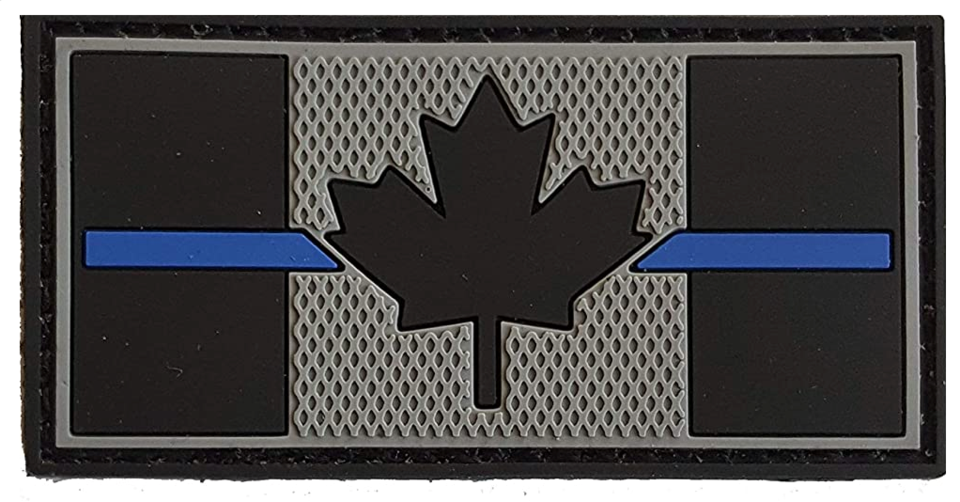A retired Ā鶹“«Ć½Ó³»police officer who now serves as a city councillor did not breach the city’s code of conduct when he wore a “thin blue line” patch on his jacket while attending a public event in Gastown in December 2022.
That is the ruling from Lisa Southern, the city’s integrity commissioner, who recently posted her decision to the city’s website in response to a citizen’s complaint lodged against Brian Montague.
“[Councillor] Montague’s wearing of the emblem is a permissible form of expression under the Charter of Rights and Freedoms and there is no reasonable basis under the code of conduct bylaw to restrict his expression in this instance,” Southern wrote.
“His wearing of the emblem is expression of his opinion, and although there may be disagreement with his opinion, the wearing of the emblem does not ‘discriminate, harass, or defame any person’ as those terms are legally interpreted.”
The complaint from the citizen, who was not identified in Southern’s ruling, was made Dec. 17, 2022 after a photograph circulated via social media of Montague and some fellow councillors at a “Janes Walk” event in Gastown.
Montague, who was elected in October 2022 as an ABC Ā鶹“«Ć½Ó³»councillor, was wearing a jacket with a thin blue line patch on the sleeve.

White nationalist movements
The patch, which depicts a Canadian flag with a thin blue line running through it, is a controversial symbol and triggered a separate complaint to the police board related to a Ā鶹“«Ć½Ó³»cop wearing the emblem while on duty at a protest in November 2021.
The complainant in the case against Montague was concerned the patch was a symbol of hate, division, inequity and injustice. The citizen said the emblem was closely linked to the “Blue Lives Matter” slogan adopted in response to the Black Lives Matter movement.
The complainant provided examples of the thin blue line flag where it was seen at far-right rallies, including in Canada, and cited the flag appearing as a counter point to a Black Lives Matter rally in Calgary in 2020.
In Canada, the symbol of a horizontal blue bar across a monochrome Canadian flag has been used by some white nationalist movements, according to Southern’s ruling.
The commissioner said Montague and the citizen initially agreed to an informal resolution process. That ended when the complainant notified Southern’s office Sept. 13, 2023 that they preferred “a formal outcome,” which led to an investigation and ruling.
Southern outlined Montague’s response to wearing the patch, noting he wore it with the intention of “showing support to those who currently serve and protected in the Ā鶹“«Ć½Ó³»Police Department and as a memorial” to fallen officers.
Montague was a member of the VPD for 28 years and lost friends and colleagues.
“He acknowledged that while to him the thin blue line emblem was a sign of support for police, others considered it a sign of division with a negative meaning,” Southern said. “He said his intention was never to convey support for intolerance, division, or discriminatory conduct.”
'Trauma from the job'
Montague disagreed the emblem constituted hate speech or discrimination, or that it contravened the code of conduct bylaw, which is a set of principles and rules governing the conduct of council.
He reiterated his position Tuesday in a text message to Glacier Media.
“The symbol is a show of my support for police [current and retired] in the City of Ā鶹“«Ć½Ó³»and those across the country who make sacrifices every day so the public can feel free to safely go about their day,” he said.
“It is a show of my support to the families and colleagues of fallen officers, not just those who died in the line of duty, but also those who died at their own hands related to the trauma from the job — including many who I have personally lost.”
Added Montague: “While I understand some have a different opinion, I don’t agree with it. I also don’t agree with those who have tried to hijack the symbol in an attempt to justify their own cause or change its meaning.”
Patch not authorized on VPD uniforms
While the ruling clears Montague of a breach of the code of conduct, the patch is not allowed to be worn by serving Ā鶹“«Ć½Ó³»police officers, as Glacier Media reported in January 2023.
“Current policy states that no unauthorized modifications to member’s issued uniforms or accessories are permitted unless otherwise authorized,” said a report that went before the police board. “The thin blue line patch is not an authorized uniform item.”
The report said a reminder was sent Jan. 6 to all officers about the department’s uniform policy “to ensure their continued awareness of the importance of adhering to said policy.”
The report said the term “thin blue line” is an adaptation of the term “thin red line” which originated when red-coated members of a Scottish regiment of the British Army stood their ground, despite being outnumbered by their Russian foes, in a battle during the Crimean War in 1854.
While it is not known when the term was first applied to police, Los Angeles Police Department Chief William H. Parker popularized it in the 1950s, according to the report.
“The term and associated symbols evolved organically over many decades, and have become instilled with rich meaning for generations of police officers in North America,” the report said. “The term has become so mainstream in Canadian policing that Blue Line is the name of a respected national policing magazine.”
'The brotherhood, the sisterhood'
At the April 2022 board meeting, Chief Adam Palmer said the patch was worn by “a relatively small number” of officers. At the time, he said officers viewed the patch as a connection with fallen officers who have been killed in the line of duty.
“They see service and sacrifice, they see esprit de corps as members of the policing community — the brotherhood, sisterhood, that kind of idea,” Palmer said. “Officers wearing those patches are not wearing them as any kind of show of white supremacy, or anything like that.”
Southern pointed out in her ruling that in 2020 an RCMP directive eliminated the emblem from being worn on uniforms.
In 2022, the Calgary Police Department came to the same decision to eliminate the patch from being worn on its uniforms, although a controversy arose in early 2023 when officers were still permitted to wear pins of the symbol on their uniforms.
“Based on our findings about the origin of the thin blue line and its changing and differing interpretations, we find [Montague’s] wearing of the emblem did not make a distinction based on a personal characteristic of an individual or a group,” Southern concluded.
“It also did not impose burdens, obligations, or disadvantages on an individual or a group, nor did it limit anyone’s access to opportunities, benefits, or advantages.”



